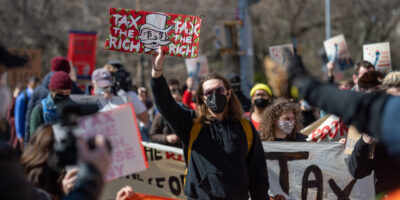
“Specialization and productivity increase when the market’s size extends across national borders. But tariffs reduce the extent of the market and thereby reduce specialization.” ~Paul Mueller
READ MORE
“The goal is not to raise revenue so we can support the poor; instead, the US is pursuing the simpler goal of eliminating private concentrations of wealth.” ~Michael Munger
READ MORE
“To the extent we believe in giving government assistance to those with incomes, we should trust them to love themselves and their families more than the government does and give them that aid in cash.” ~Gary Galles
READ MORE
“Perhaps an Orangeopian union or minimum wage can at least decrease income inequality, or maybe even increase the per capita standard of living?” ~Bruce Rottman
READ MORE
“State ‘incentive’ packages do more than pay companies the difference in costs. Politicians have every reason to pay up to, and beyond, the entire economic benefit to the state, because their calculus counts costs as benefits.” ~ Michael Munger
READ MORE
“During normal times, when inflation is low and stable, the floor system increases the burden on taxpayers. The burden is even larger when inflation is high, as it has been over the past two years.” ~ Louis Rouanet
READ MORE
“Policy makers should ensure that the US payment landscape is efficient, accessible, and beneficial for all stakeholders involved with as little government involvement as possible.” ~ Nicolas Cachanosky
READ MORE
“It’s an updated form of participatory democracy, with citizens ‘voting’ with their dollars. The fundamental difference lies in choice, as people aren’t taxed forcibly but choose to back a project or refrain.” ~ Max Borders
READ MORE
“The incentives of politicians and the goals of citizens can diverge, and nowhere is that divergence more obvious than in the case of targeted, private benefits to specific corporations paid for at public expense.” ~ Michael Munger
READ MORE
“When externalities exist and interested parties can negotiate and trade, they can discover who puts the highest value on using or possessing a resource.” ~ Christopher Lingle and Janna Lu
READ MORE
“The underlying problem with social justice is the failure to distinguish between negative rights, which protect liberty and property, and positive rights, which provide a license to violate established negative rights.” ~ Robert F. Mulligan
READ MORE
“Banning menthol cigarettes would only exacerbate America’s substantial trade in cigarette tax evasion and avoidance, this time with an assist from transnational crime syndicates.” ~ Michael LaFaive and Todd Nesbit
READ MORE250 Division Street | PO Box 1000
Great Barrington, MA 01230-1000
Press and other media outlets contact
888-528-1216
press@aier.org
This work is licensed under a
Creative Commons Attribution 4.0 International License,
except where copyright is otherwise reserved.
© 2021 American Institute for Economic Research
Privacy Policy
AIER is a 501(c)(3) Nonprofit
registered in the US under EIN: 04-2121305